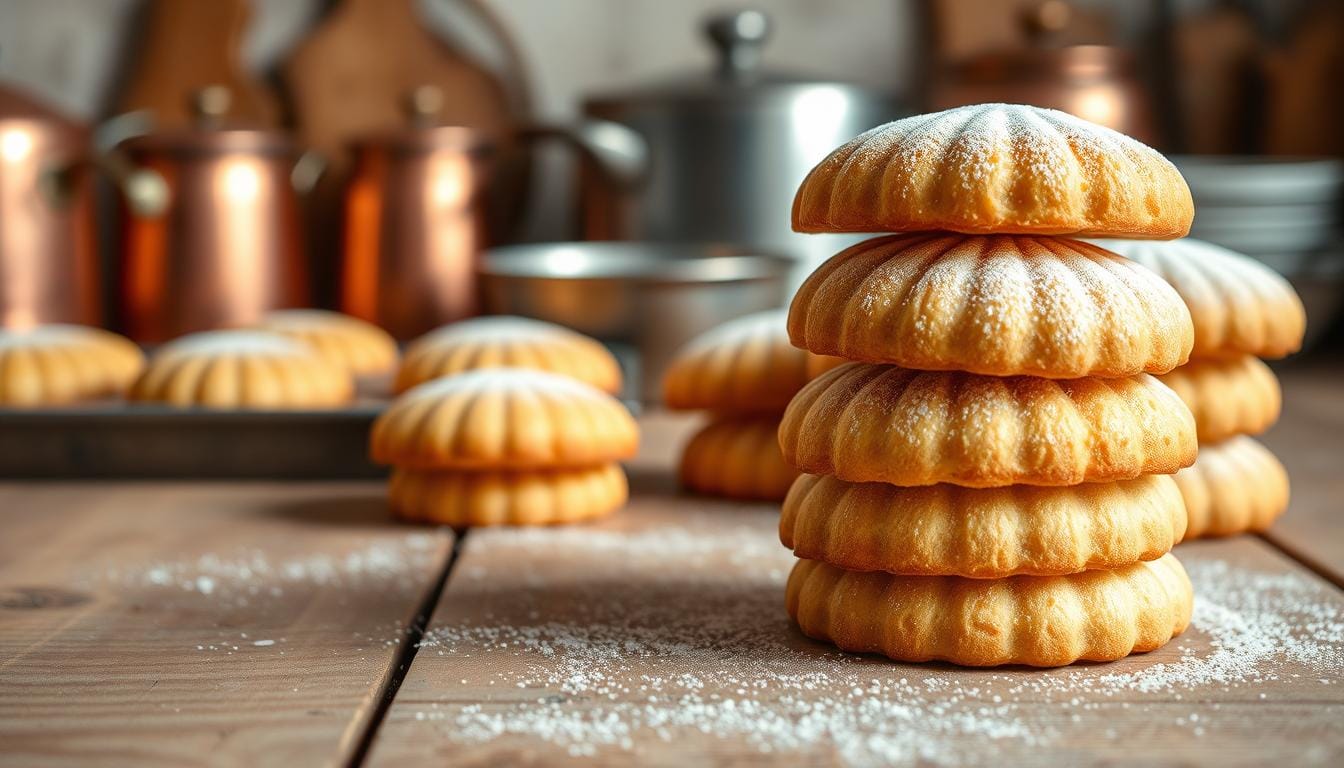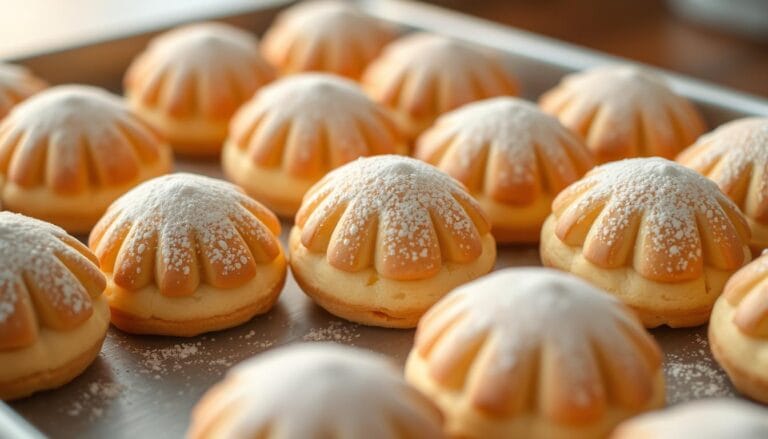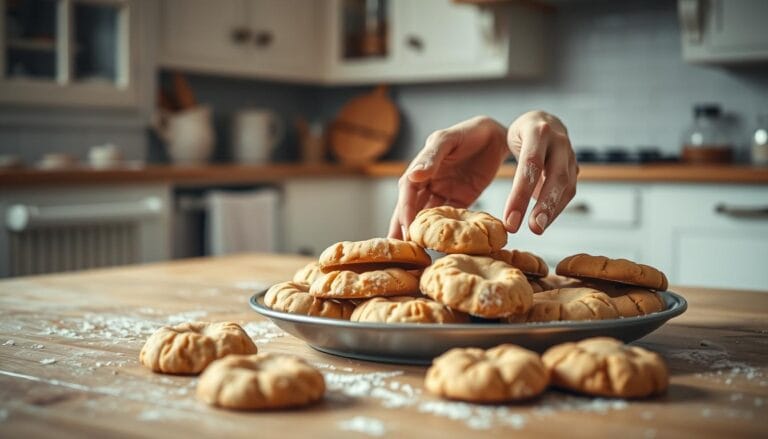Madeleine Cookie Recipe
Discover the elegance of French butter cookies with this authentic madeleine cookie recipe. These shell-shaped pastries are more than just a sweet treat. They’re a culinary experience that brings the charm of French bakeries right into your kitchen.
Madeleine cookies represent a delicate balance of texture and flavor. They transform simple ingredients into an extraordinary dessert. Whether you’re a seasoned baker or a curious home cook, this guide will help you create perfect French butter cookies. They will impress your family and friends.
Table of Contents
Understanding the Classic French Madeleine
The madeleine is a beloved French pastry. It turns simple ingredients into a masterpiece. These tea cakes have won the hearts of food lovers everywhere, especially because of their link to Marcel Proust’s books.
History of Proust’s Beloved Tea Cake
Proust’s petite madeleine became famous in his novel. A single bite brings back childhood memories. It’s not just a cake; it’s a symbol of remembering through taste and smell.
Distinctive Characteristics
What makes madeleines special is their unique features:
- Signature shell-like shape
- Light, airy génoise sponge texture
- Golden-brown exterior with a subtle buttery flavor
- Distinctive bump or “hump” on one side
Traditional Shape and Preparation
Real madeleines need a special pan to get their iconic shape. Making these tea cakes is a precise art. It turns simple ingredients into a French delicacy.
“A madeleine is not just a cake, but a portal to memory” – Inspired by Marcel Proust
Enjoy madeleines with afternoon tea or as a sweet treat. They show the best of French baking.
Essential Ingredients for Perfect Madeleines
Starting with the right ingredients is key to making delightful afternoon tea sweets. Madeleines, those classic French treats, need specific ingredients to become a true delight. These ingredients turn simple items into a fancy dessert.
Here are the main ingredients you’ll need for your madeleines:
- 1 cup all-purpose flour (120g)
- 1/2 cup granulated sugar (100g)
- 2 large eggs
- 1/2 cup unsalted butter
- 1/2 teaspoon baking powder
- 1/4 teaspoon kosher salt
- 1 teaspoon vanilla extract
- 2 teaspoons lemon or orange zest
The secret to lemon-scented desserts is the citrus zest. It adds a bright, deep flavor to your madeleines. This makes them go from simple cookies to fancy treats for afternoon tea.
Butter is essential for the soft, rich texture of madeleines. Use top-quality, unsalted butter for the best taste. Eggs help make the madeleines soft and delicate, which is their special charm.
Measuring ingredients accurately is important. Use a kitchen scale for flour and sugar. This ensures your madeleines will always have the right texture and taste.
Required Equipment and Tools
Making authentic madeleines needs special equipment to turn your kitchen into a French bakery. The right tools can elevate your traditional French pastries from good to great.
Choosing the Right Madeleine Pan
The journey to a true madeleine experience begins with the iconic shell-shaped pan. When picking your madeleine pan, look for these important features:
- Nonstick coating for easy release
- Durable metal construction
- Distinctive shell-shaped molds
- Size right for 18 madeleines
Alternative Baking Equipment
If you don’t have a special pan, small muffin tins can be a good substitute. They help in making these delightful French treats.
| Equipment | Purpose | Recommendation |
|---|---|---|
| Madeleine Pan | Primary Baking Surface | Preferred Choice |
| Muffin Tin | Alternative Baking Surface | Acceptable Substitute |
Essential Kitchen Tools
But it’s not just about the pan. You’ll also need certain tools for perfect madeleines:
- Hand mixer or stand mixer with whisk attachment
- Pastry brush for greasing
- Cookie scoop (optional but helpful)
- Cooling rack
- Measuring cups and spoons
With these tools, you’re all set to make delicious madeleines. They’ll take you straight to a Parisian bakery.
Mastering the Brown Butter Technique
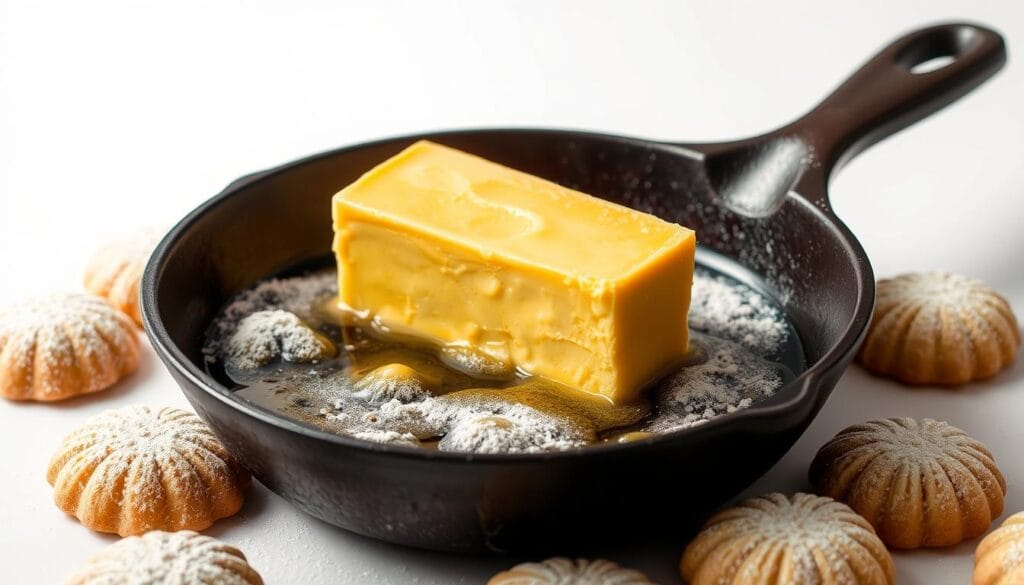
Creating amazing buttery baked goods begins with brown butter. This technique turns your madeleines into something special. It adds a rich, nutty flavor that excites your taste buds.
To make brown butter, heat unsalted butter until it’s golden brown. It should smell nutty. This step needs patience and care to get the best flavor.
- Use 16 tablespoons (227g) of high-quality unsalted butter
- Heat butter over medium-low heat
- Stir constantly to prevent burning
- Watch for golden-brown color and nutty fragrance
Professional bakers pay close attention to brown butter. The key is to heat the butter slowly. This way, the milk solids caramelize without burning. It turns regular butter into a flavor enhancer for your madeleines.
Mastering brown butter opens up new culinary adventures. It’s not just for madeleines. It can improve many buttery baked goods, making it a must-know skill for serious bakers.
Pro Tip: Remove the butter from heat the moment it turns golden brown to prevent bitter flavors.
Your brown butter should look deep amber and smell like caramel. Let it cool a bit before adding it to your batter. This ensures the right texture and taste in your madeleines.
Step-by-Step Madeleine Cookies Preparation
Making French butter cookies needs precision and care. Madeleine cookies are delicate pastries that require careful preparation. This ensures they have their signature texture and shape.
Mixing the Perfect Batter
Your madeleine cookies start with careful ingredient preparation. Follow these crucial steps:
- Sift 115g (¾ cup + 1 tbsp) of all-purpose flour with 3/4 teaspoon salt
- Beat 2 large eggs with 100g (½ cup) granulated sugar for about 10 minutes
- Whip until the mixture reaches the ribbon stage – where batter falls back into the bowl in thick ribbons
- Gently fold sifted flour into the egg mixture in 2 separate additions
Chilling for Optimal Results
Chilling is key for flavor development and the classic madeleine hump. Refrigerate your batter for at least 2 hours, or up to 24 hours before baking. This step melds ingredients and creates the signature texture of these French butter cookies.
| Chilling Duration | Recommended Outcome |
|---|---|
| 2-4 hours | Good flavor development |
| 12-24 hours | Excellent flavor complexity |
Filling the Madeleine Molds
Prepare your madeleine pan by generously buttering each mold. When ready to bake, let the batter sit at room temperature for 10 minutes. Fill each mold about three-quarters full – approximately 85-90% – to ensure proper rise and classic shape.
“The secret to perfect madeleines lies in the details of preparation and patience.” – French Pastry Chef
Bake at 350°F for 8-11 minutes, watching carefully to achieve that golden-brown perfection. Remove immediately and shake out of the molds to prevent sticking.
Baking Temperature and Timing Guide
Getting the perfect bake for shell-shaped pastries like madeleines needs precision. You must control the heat and timing well. This way, you’ll get those golden-brown treats everyone loves.
The best baking temperature for madeleines is between 350°F and 375°F (175°C-190°C). This range is key for their unique taste and texture.
Baking Time Recommendations
- Initial high-temperature bake: 3-4 minutes at 425°F (220°C)
- Reduce temperature to 320°F (160°C)
- Continue baking: 5-8 minutes
- Total baking time: 8-12 minutes
Look for these signs to know your madeleines are done:
- Edges turn golden brown
- Tops spring back when lightly touched
- Distinctive “hump” forms on the surface
| Baking Stage | Temperature | Time |
|---|---|---|
| Initial High-Heat Stage | 425°F (220°C) | 3-4 minutes |
| Finishing Bake | 320°F (160°C) | 5-8 minutes |
Oven variations can change baking times. So, watch your pastries closely and adjust as needed. An oven thermometer ensures consistent temperature for perfect results.
Creating the Signature Madeleine Hump
The iconic bump of génoise sponge cakes makes madeleines truly special. This distinctive feature sets authentic madeleines apart from ordinary sponge cakes. It creates a visual and textural masterpiece that delights bakers and food enthusiasts alike.
Achieving the perfect madeleine hump requires precision and understanding of baking science. Génoise sponge cakes depend on specific temperature and technique to create their characteristic rise.
Temperature Control Secrets
To develop the signature hump, you’ll need to master temperature manipulation. The ideal initial baking temperature ranges between 400°F and 425°F. This high heat creates an immediate steam reaction that pushes the batter upward.
- Start with a preheated oven at 425°F
- Drop temperature to 375°F after the bump begins forming
- Chill batter for at least 12 hours before baking
Batter Consistency Techniques
The moisture and composition of your génoise sponge cakes batter play a crucial role in hump formation. Proper egg aeration and precise fat incorporation are key to achieving the perfect rise.
“The magic of madeleines lies in the delicate balance between ingredients and technique.”
Critical factors for batter success include:
- Thoroughly beaten eggs to incorporate maximum air
- Carefully folded dry ingredients
- Correctly melted and cooled butter
- Minimal mixing to preserve air bubbles
By understanding these intricate details, you’ll transform your génoise sponge cakes from ordinary to extraordinary. You’ll create madeleines with a professional-quality hump every time.
Flavor Variations and Add-ins
Turn your classic madeleines into lemon-scented desserts with exciting flavors. These treats are perfect for afternoon tea. Whether you’re a pro or a beginner, you can make them special with simple changes.
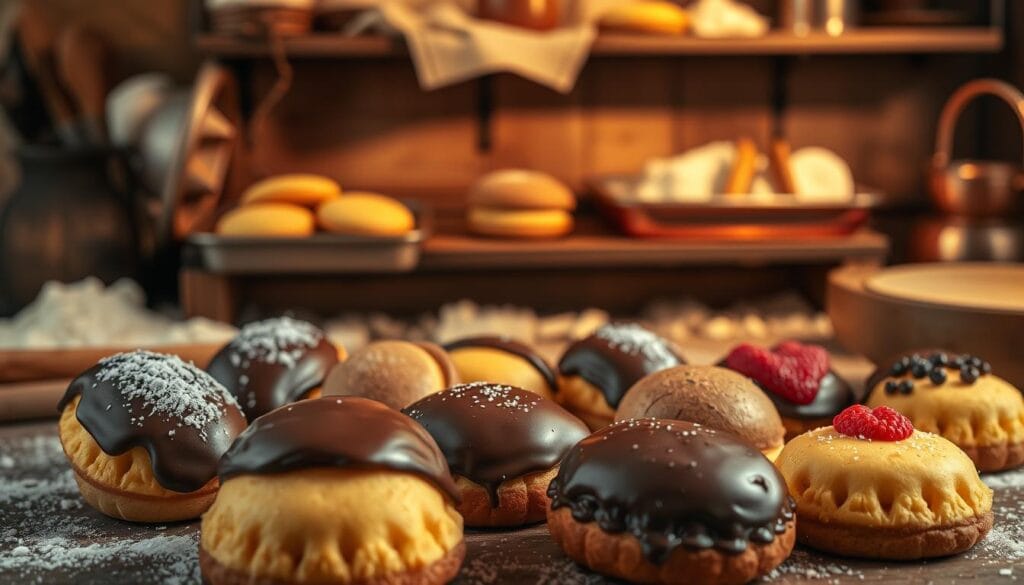
- Citrus Variations
- Lemon zest (classic choice)
- Orange zest
- Lime zest for a tangy twist
- Chocolate Lovers
- 2 tablespoons cocoa powder per cup of flour
- Dark chocolate glaze
- Chocolate chip mix-ins
- Nutty Flavors
- Almond extract
- Finely chopped pistachios
- Hazelnut crumbs
Want to add more flavor? Try these:
- Add 2 tablespoons of maple syrup to the batter
- Incorporate 1 teaspoon of vanilla extract
- Sprinkle orange zest from ¼ orange
“The beauty of madeleines lies in their versatility – each variation tells a unique culinary story.”
When adding mix-ins, keep your treats light. Fold gently and don’t overmix. Your lemon-scented desserts will be a hit, making a simple treat into a gourmet delight.
Storage and Serving Suggestions
Your delicate tea cakes need special care to keep their texture and flavor just right. Madeleines are best eaten within a few hours of baking. This way, you get their light and delicate taste. After they cool down, you can store them using simple methods.
Storage Tips for Maximum Freshness
- Store madeleines in an airtight container at room temperature
- Keep them fresh for up to 2 days after baking
- Use a sealed cookie box in the refrigerator to extend shelf life to 5 days
- Freeze madeleines in Ziploc bags for up to 1 month
When freezing, wrap your madeleines carefully to prevent moisture loss. Pro tip: Place a piece of parchment paper between layers to prevent sticking.
Serving Recommendations
These exquisite tea cakes are best enjoyed with the right drinks. Pair your madeleines with:
- Lemon almond tea
- Classic French press coffee
- Earl Grey tea
- Chamomile tea for a soothing experience
“A madeleine is more than a pastry – it’s a moment of pure French culinary poetry.” – French Pastry Chef
For the best presentation, serve madeleines slightly warm. This lets their butter and vanilla flavors shine. Your guests will love the authentic French pastry experience you’ve created.
Troubleshooting Common Madeleine Problems
Making perfect madeleines takes practice and care. Even skilled bakers face issues when baking these French treats. Knowing common problems helps you get better results.
Baking madeleines needs focus on details. Texture and shape are key to success.
Texture Challenges
Texture issues often come from how you mix and handle ingredients. Here are some fixes:
- Overmixing makes the treats tough and dense
- Whip egg mixture for 2-3 minutes until it’s light and fluffy
- Don’t overwork the batter to keep it light
Shape and Baking Difficulties
Getting the right madeleine shape is all about precision:
| Problem | Solution |
|---|---|
| No signature hump | Chill batter for 30 minutes before baking |
| Uneven baking | Use a 350°F oven temperature |
| Sticking to pan | Use neutral spray oil or butter and flour |
Preventing Common Mistakes
For successful madeleine baking, follow these tips:
- Chill batter up to 24 hours before baking
- Bake for 10-12 minutes max
- Use fresh ingredients at room temperature
Pro tip: A well-made madeleine should have a golden shell and a soft, spongy inside.
Conclusion
Your journey into making Proust’s petite madeleine has changed you. You’ve moved from a beginner to a skilled French butter cookie maker. You now know how to make the batter just right and shape the cookies perfectly.
Each madeleine has its own story. You can try classic vanilla, zesty lemon, or matcha flavors. The important things are to use the right ingredients, chill the batter, and bake at 375°F. This way, you get cookies that are light, tender, and golden.
Keep learning and practicing to get better at making madeleines. Soon, you’ll be making these French cookies that taste amazing and connect you to a long tradition. Your kitchen is now a place where you can make magic happen with French treats.
Now, you can turn simple ingredients into amazing madeleines that would impress any French baker. Enjoy the sweet results of your baking skills!
FAQ
What are madeleines?
Why do madeleines have a distinctive hump?
Do I need a special pan to make madeleines?
How long do madeleines stay fresh?
Can I add different flavors to madeleines?
What is the connection between madeleines and Marcel Proust?
Why is browning butter important in madeleine recipes?
Are madeleines difficult to make?
Source Links
- How to Perfect the Madeleine Cookie Recipe – A Beginner’s Guide – Madeleine Kitchen – https://www.madeleinekitchen.com/madeleine-cookie-recipe/
- Madeleine Cookies – https://easydessertrecipes.com/madeleine-cookies/
- Madeleines – https://www.tasteofhome.com/recipes/madeleines-recipe/?srsltid=AfmBOoqKOgM82foNDYgYEHmrmzQKMewfA_zm1RzWo5IW0KtIdPkKrhaa
- Classic French Madeleines – Baker by Nature – https://bakerbynature.com/classic-french-madeleines/
- How to Make Classic Madeleines – https://foodnouveau.com/classic-madeleines/
- Classic French Madeleines | bakeologie – https://thebakeologie.com/classic-french-madeleines/
- Madeleines Recipe: How to Make French Butter Cakes – Mon Petit Four – https://www.monpetitfour.com/madeleines-recipe/
- Madeleines Are The Easiest French Dessert To Bake – https://www.delish.com/cooking/recipe-ideas/a41004403/french-madeleines-recipe/
- A Recipe that Works! – Weekend Bakery – https://www.weekendbakery.com/posts/madeleines-a-recipe-that-works/
- High Altitude French Madeleines – Curly Girl Kitchen – https://curlygirlkitchen.com/high-altitude-french-madeleines/
- Brown Butter Madeleines – https://www.barleyandsage.com/brown-butter-madeleines/
- French Chocolate Madeleines – https://familystylefood.com/chocolate-madeleines/
- Joy’s Brown Butter Chocolate Chip Cookies with Pecans – https://www.kingarthurbaking.com/recipes/joys-brown-butter-chocolate-chip-cookies-with-pecans-recipe
- The Madeleine: A Petite French Pastry with Big Charm – https://zeroinacademy.com/the-madeleine-a-petite-french-pastry-with-big-charm/
- Our Madeleine Recipe Includes the Classic and 8 Variations – https://www.marthastewart.com/856115/vanilla-madeleines
- How To Make Perfect Lemon Madeleines – Light, Fluffy & Buttery. | Matthew James Duffy – https://matthewjamesduffy.com/how-to-make-lemon-madeleines/
- Madeleines – https://www.tasteofhome.com/recipes/madeleines-recipe/?srsltid=AfmBOooU1wJPcwgHITPkcn6wRc4lwkXCENhoWJClRlivN0GHlHiPDAuZ
- Madeleines – https://everythingmarina.com/madeleines/
- Perfect Madeleines — Oh Cakes Winnie – https://www.ohcakeswinnie.com/blog/perfect-madeleine
- Madeleine Cookies – https://www.africanbites.com/coconut-almond-madeleines/
- The many lives of a madeleine – https://agoodtable.substack.com/p/the-many-lives-of-a-madeleine
- How to get a Madeleine Bump | Halicopter Away – https://halicopteraway.com/2024/12/07/how-to-get-a-madeleine-bump/
- Double Chocolate Madeleines – Chocolates & Chai – https://www.chocolatesandchai.com/double-chocolate-madeleines/
- Madeleines – https://www.tasteofhome.com/recipes/madeleines-recipe/?srsltid=AfmBOoosHfj7NucyLz9WfUO65Z6Klt8cC_a–6Y6zygR0ou_VbDt62_y
- Madeleines – https://www.tasteofhome.com/recipes/madeleines-recipe/?srsltid=AfmBOorKdjpDW-05931NxItQFPK01gHTwAPkgt0cPFlVBc54bvtFVn83
- Madeleines (Classic French Recipe) – https://www.sweetashoney.co/madeleine-recipe/
- Madeleines – https://www.tasteofhome.com/recipes/madeleines-recipe/?srsltid=AfmBOoprgxtQWb2S31OPrWSLEXwYvUt9vttJdCxCM4N48sOKSL1O5hRO
- The perfect madeleine, with a little help from experts including Yotam Ottolenghi and Michel Roux – https://www.irishtimes.com/food/2024/03/10/the-perfect-madeleine-with-a-little-help-from-experts-including-yotam-ottolenghi-and-michel-roux/
- Madeleine Cookies Recipe Using Cream: Soft & Buttery Treat – https://savoryflow.com/madeleine-cookies-recipe-using-cream/
- Easy Madeleine Cookies with Heavy Cream for Moisture – https://diversityrecipes.com/madeleine-cookies-recipe-using-cream/
- Madeleine Cookies | Easy Recipe for Buttery & Light Treats – https://wheatrecipes.com/madeleine-cookies/

